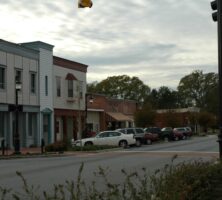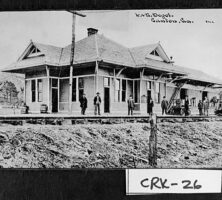Canton, the seat of Cherokee County, lies at the southern tip of the Blue Ridge Mountains in northwest Georgia.
Located on Interstate 575 forty miles north of Atlanta, Canton experienced a population and economic boom as Atlanta’s expanding metropolitan area encroached upon it. The city’s population jumped from 7,709, according to the 2000 U.S. census, to 32,973 by the 2020 census.

Situated on lands that were originally part of the Cherokee Nation, the Canton area was claimed by Georgia after gold was discovered there in 1828. By 1832 the town was called Cherokee Court House; the following year it was incorporated as Etowah and designated the county seat. In 1834 the name was changed again, to Canton, because citizens hoped to make the town a center of silk production like its Chinese namesake. In 1879, when the Marietta and North Georgia Railroad was constructed through its downtown, Canton became a tourist destination, attracting summer visitors looking to escape the more oppressive heat in the south of the state.

Canton was once a top cotton-producing area. Canton Cotton Mills was one of the largest mills in the South, and “Canton Denim” was renowned for its high quality. Marble was also a flourishing industry in the area, where Georgia Marble Finishing Works was the largest marble company. The dairy and poultry industries later became important to the town’s economy, with Cagle’s Dairy and Seaboard Farms Poultry becoming the major employers.
One place of interest is the historic 400-acre Crescent Farm estate. The Crescent Farm Rock Barn, a cherished landmark of Cherokee County, is the only rock barn in Georgia. It was built specifically as a stable for racehorses in 1906 by Augustus Lee Coggins and is now the headquarters of the Cherokee County Historical Society. The former estate residence, Edgewater Hall (also known as the A. L. Coggins House), was built in 1922 in the Georgian Revival style. The house, located on the highest point in Canton with a view of the Etowah River, was purchased by North Georgia Bank and converted to office space in 1986. Ten years later the bank sold the structure to the city of Canton, which has since used the building as its city hall.

Notable economic development in Canton includes a multimillion-dollar technology park, which is expected to create 15,000 to 25,000 jobs and provide a job market to reduce the percentage of residents who commute to jobs outside the city. The Canton Livable Center Initiative, with an investment of $5 million from the Atlanta Regional Commission to fund “smart growth” studies around Atlanta, will develop a study of the downtown area and the Etowah River Greenway to investigate housing opportunities and mixed-uses for the area.









